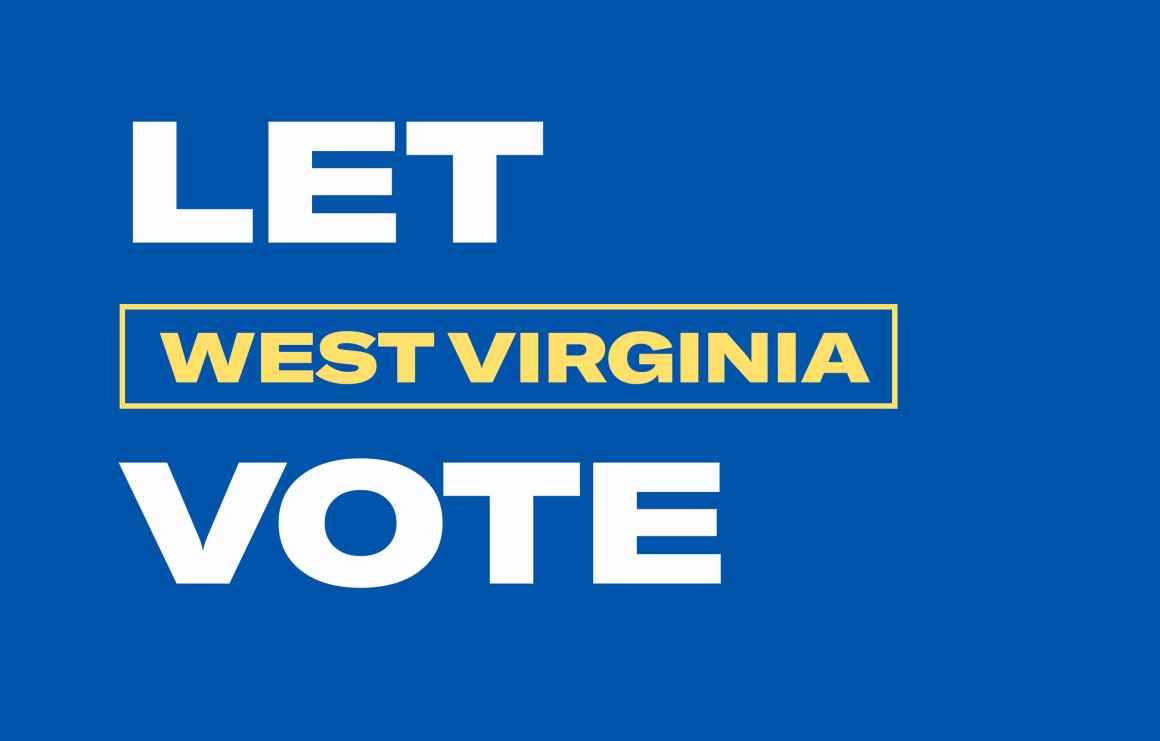

Quick Tips For Voters
Election Q & A
Problems at the Polls
Issues that Matter
Know Your Candidates
Other Offices on the Ballot

Your vote matters.
You probably hear that all the time. But what does it mean?
Your vote matters because it is a bedrock American right. Your vote matters because it is how you choose your representatives. Your vote matters because it is how you signal approval or disapproval of policies. Your vote matters because elections aren’t just about Presidents, or Congress, but are about local races where a handful of votes is often the difference. Your vote matters because your rights matter. Your vote matters because some people don’t want you to exercise your right to vote.
Over the past 10 years, more than 30 states, including West Virginia have enacted measures that make it harder to vote. Despites these measures you still have the right to vote. You have the right to elect representatives who are committed to making voting as easy, inclusive, and secure as possible.
During the same time, numerous other rights and liberties, including the right to protest, due process protections, the right to an abortion, and the separation between our government and religion have all come under attack. Your vote tells representatives to defend these rights.
This is a guide to the 2020 election. In it you’ll find a brief description of just a few of the civil liberties that may be at stake, an explanation of your rights as a voter, and a list of candidates and useful information about them.
We hope that this guide will ensure that you use your vote.

- Check your voter registration status.
- Locate your polling place and note the hours of operation.
- Consider voting early or absentee if possible. If you plan to vote at the polls, go early in the day to avoid the last-minute rush.
- Make sure you have an acceptable form of ID.
- Read all instructions carefully.
- Take your time.
- Ask for help if you need it.
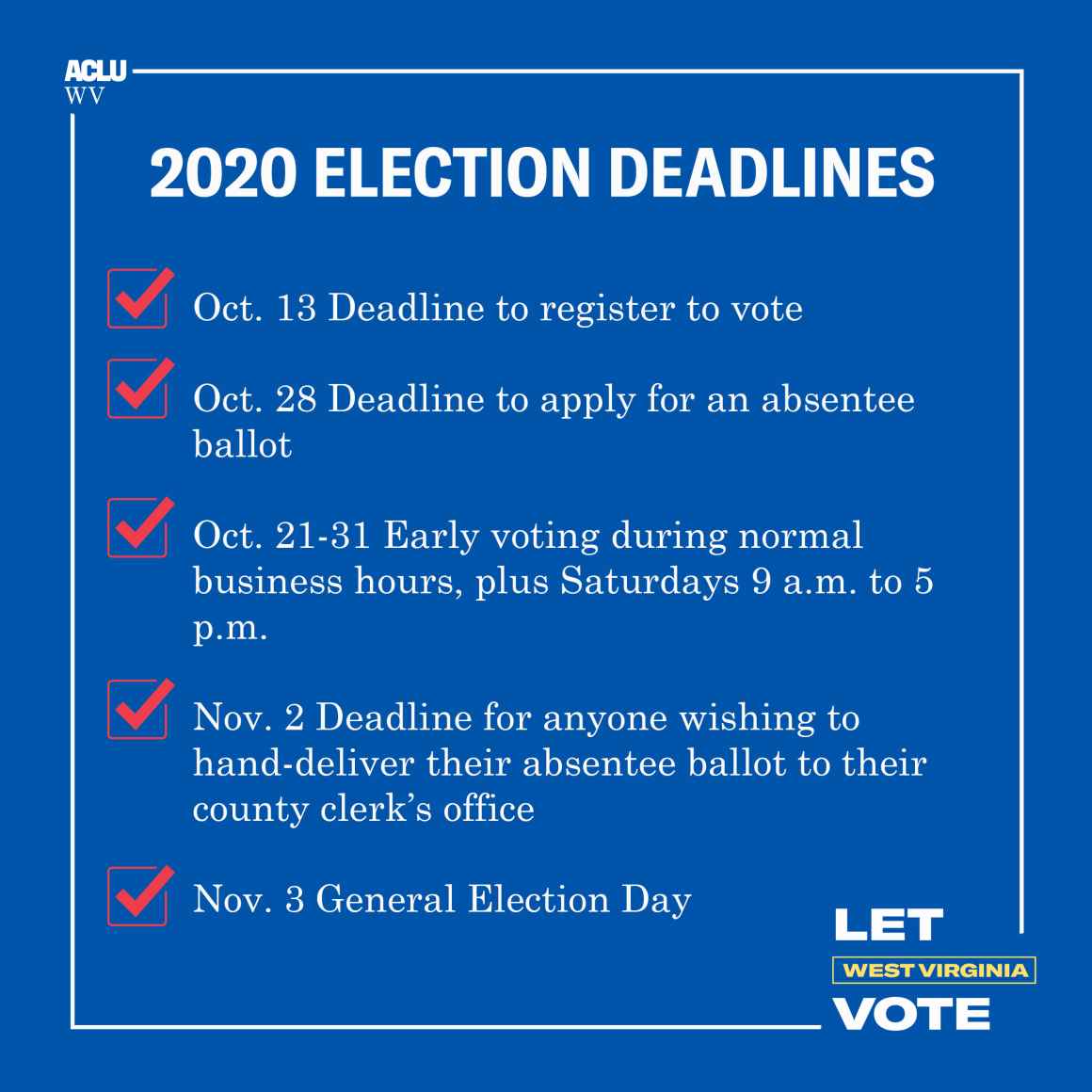

Can I vote in West Virginia?
• You can vote in the Nov. 3 election if you’re registered to vote by October 13, 2020.
• You can register to vote if you meet all of the following qualifications: (1) You are a US citizen and a WV resident; (2) You will be 18 by the time of the election; (3) You are not currently serving a sentence, or parole or probation for a felony, bribery in an election, or treason.
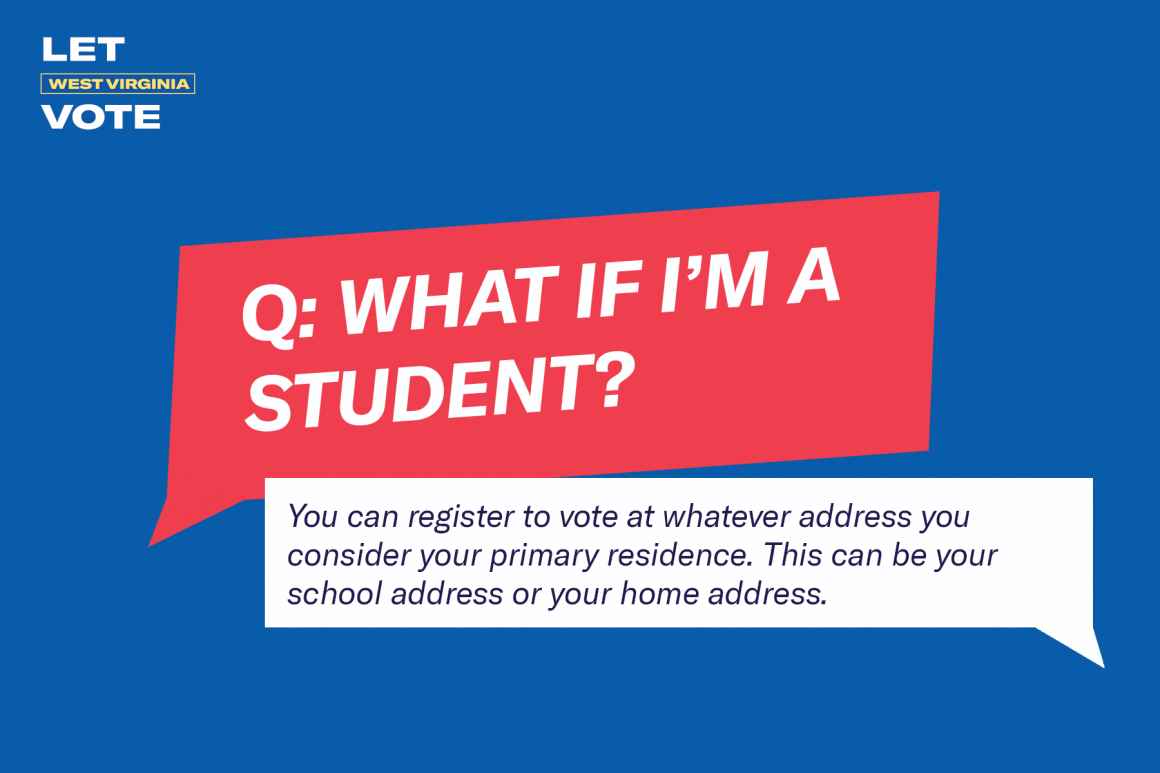
What if I’ve been convicted of a crime?
• If you were convicted of a misdemeanor you can vote, even if you are in jail.
• If you were convicted of a felony, bribery in an election, or treason, you cannot vote while you are serving your sentence, including probation or parole.
• If you have been charged with a crime, but not convicted, you can vote.
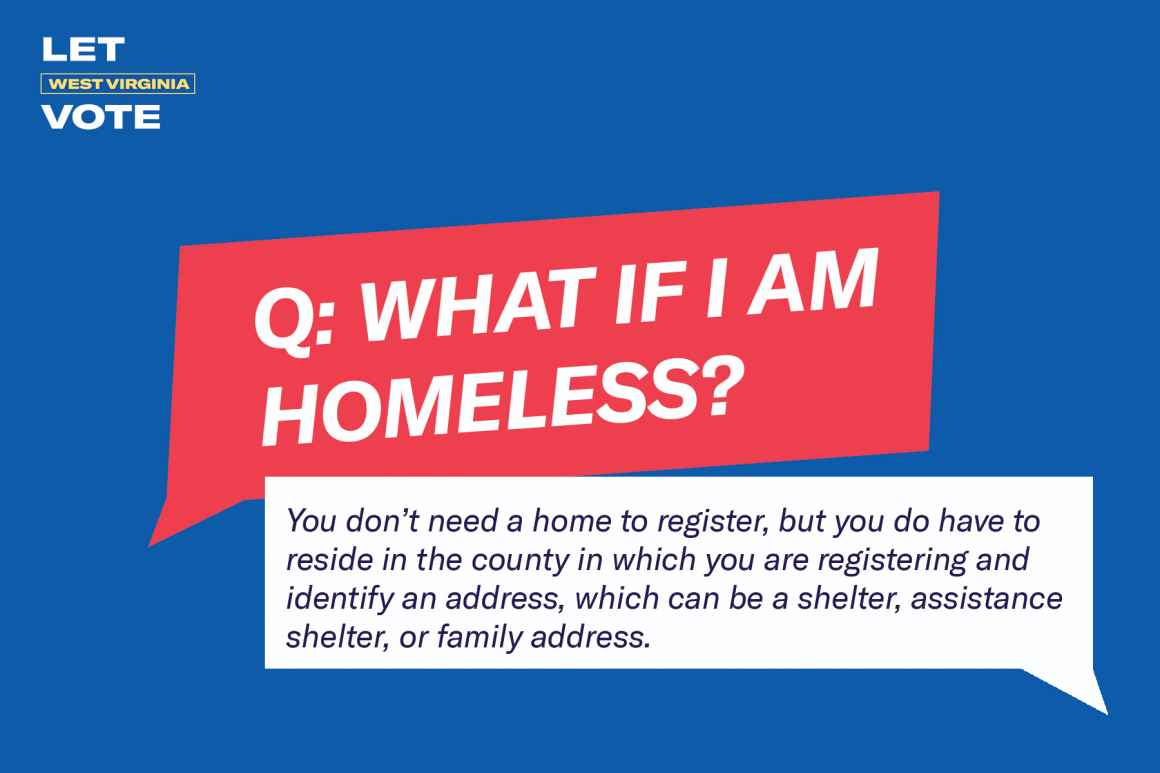
What if I’ve moved or changed my name?
• You have to re-register every time you move or change your name.
• If you moved or changed your name before Oct. 13, 2020 you can vote normally if you moved within the same precinct. You can vote provisionally if you moved within the same county. If you moved outside your county and did not re-register to vote you won’t be able to vote in the November 3 election.
• If you moved after October 13, 2020, call your County Clerk’s Office as soon as possible to find out where to vote.
How do I know if I’m registered?
• You can check your registration status online at https://services.sos.wv.gov/Elections/Voter/AmIRegisteredToVote, or by calling your County Clerk’s Office.

• You can register to vote:
- in person, by filling out a voter registration application at your county clerk’s office;
- by mail, by filling out a mail-in voter registration application and mailing it to your county clerk’s office;
- online, by filling out a voter registration form at https://ovr.sos.wv.gov/Register;
- when you apply for services at the Division of Motor Vehicles (DMV), and state agencies that provide public assistance (such as Medicaid, WIC, and food stamps) or services to people with disabilities. You may also register at marriage license offices and military recruitment offices.
• You can get a mail-in voter registration application from the Secretary of State’s office, your county clerk’s office, from most libraries, colleges, and high schools, by calling 304-558-6000, or online at https://ovr.sos.wv.gov/Register#Qualifications
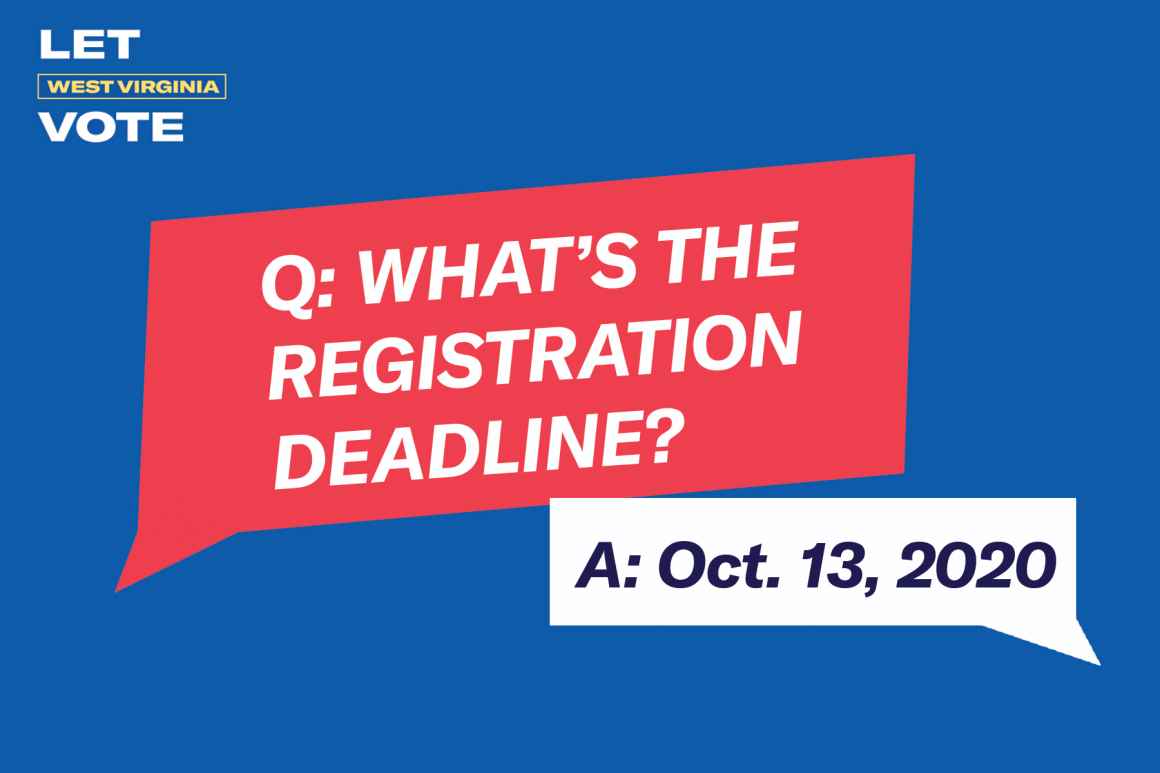
What if I miss the deadline?
• You won’t be able to vote in the Nov. 3 election, but you can register to vote for future elections.

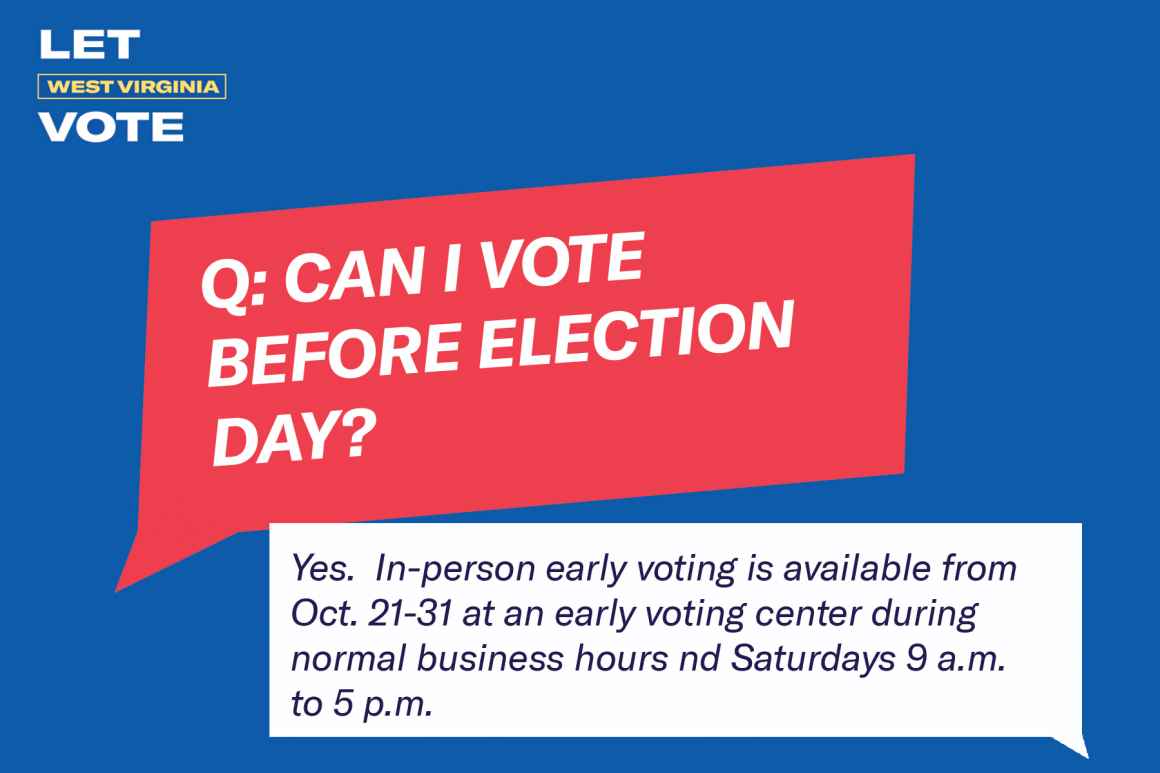
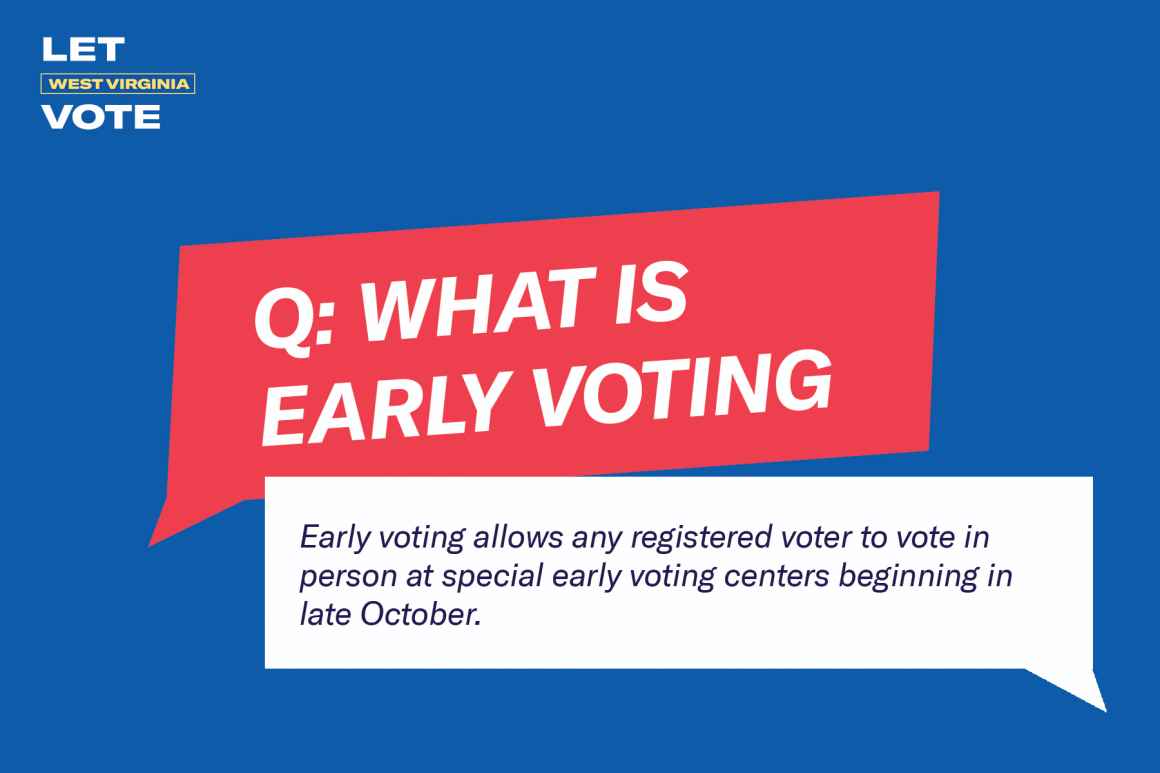
• Contact your County Clerk for the location and hours of an early voting center near you.
Can I vote absentee?
• In the 2020 election all voters may use Covid-19 as a medical excuse to vote by absentee ballot. Voters must request an absentee ballot.
How do I get an absentee ballot?
• Ballot applications will NOT be mailed to all voters for the 2020 general election.
• Applications must be received no later than Oct. 28, 2020.
• You can fill out an application online at gowvotewv.com, or you can get an application from your County Clerk’s office, or by downloading one at http://www.sos.wv.gov/elections/forms/Documents/Forms%20-%20Voter/Absentee%20Ballot%20Application.pdf,. If your application is approved, your ballot will be mailed to you.
How do I know if my absentee ballot has been counted?
• You can check the status of your ballot by contacting your county clerk, or online at: https://services.sos.wv.gov/Elections/Voter/AbsenteeBallotTracking
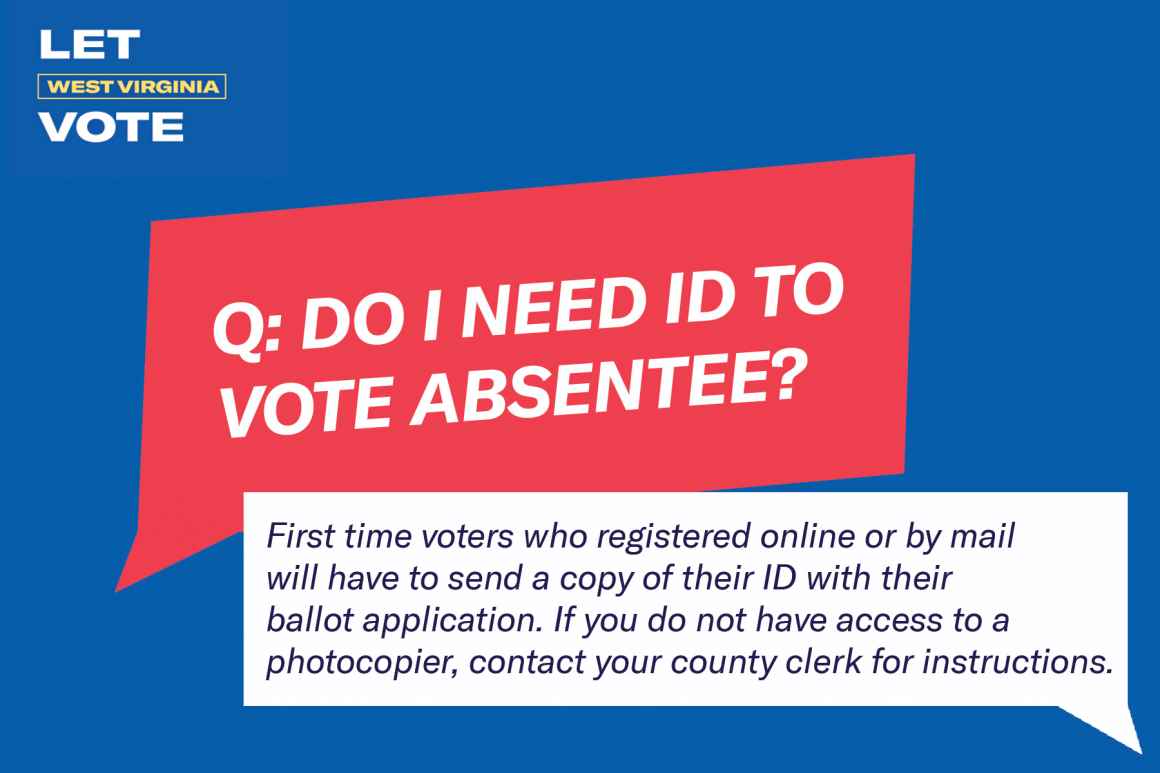
What’s the deadline for returning my absentee ballot?
• To be counted, your ballot must be postmarked no later than election day and received by your County Clerk’s office no later than five days after the election, excluding Sundays.

When is Election Day?
• Tuesday, Nov. 3.
When are the polls open?
• Polling places are open from 6:30 AM through 7:30 PM. You have the right to vote if you’re in line or inside your polling place when the polls close.
Can I get time off from work to vote?
• West Virginia law requires employers to give employees up to 3 hours of paid time on Election Day to vote. Employees must request this time 3 days before the election. Certain essential employees may be given time off during early voting instead of on election day.
Where do I vote?
• On Election Day, you have to vote at the polling place to which you’re assigned.
• Your assigned polling place will be listed on the voter registration card that you should receive in the mail when you register.
• If you do not have your card, you can call your local elections office or look up your polling place online at: https://services.sos.wv.gov/Elections/Voter/FindMyPollingPlace.
What if I am disabled and my polling place is not accessible?
• If you find this out before Election Day, call your County Clerk right away and ask for an accommodation. You must request a reassignment no later than 30 days prior to the election.
• You can also send someone into the polling place to request curbside voting on your behalf. Poll workers will bring a ballot or voting machine outside so you can vote.
• Otherwise, bring one or more people to assist you. You have the right to have anyone you choose assist you, as long as the person is not your employer, an agent of your employer, an officer or agent of your labor union, or the judge of elections.
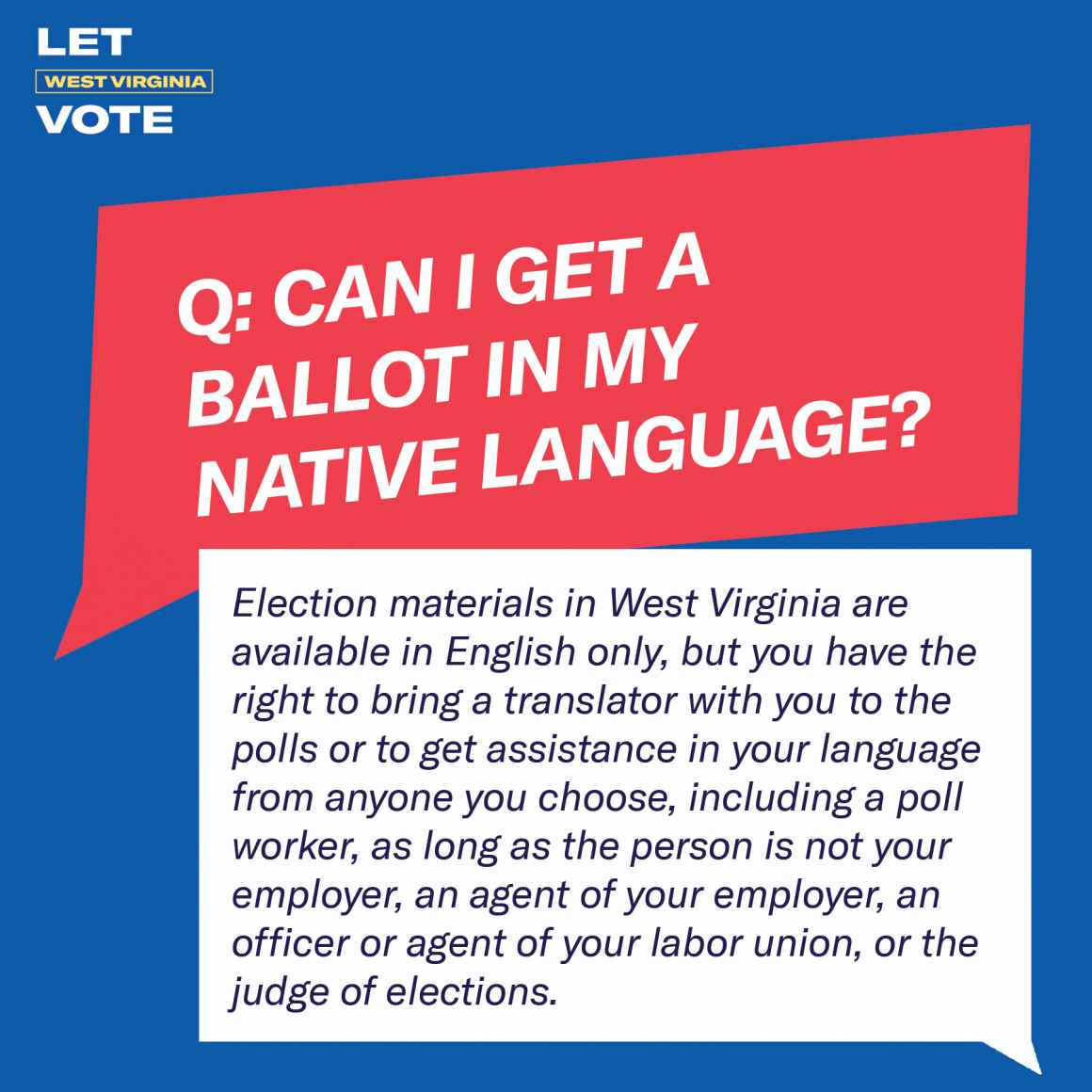
What if I need help in the voting booth?
• If you need help because of a physical disability or because you can’t read the ballot, tell a poll worker when you get to your polling place. You have the right to vote on an accessible voting machine. You also have the right to have anyone you choose assist you in the voting booth, including a poll worker, as long as the person is not your employer, and agent of your employer, or an officer or agent of your labor union.
• If you need language assistance, bring an interpreter with you to the polls. You have a right to bring an interpreter with you to communicate with poll workers and translate the ballot.
• If you need instructions on how to use the voting equipment, ask a poll worker for help. Poll workers are required to help you at any time you ask – even after you have entered the voting booth.
What if I cannot go to my polling place?
• If you are hospitalized, or a poll worker, and in some counties if you are a new resident to a hospital or nursing home you can apply for an emergency absentee ballot. You can apply 7 days before the election up to noon of Election Day. In that case, two election workers will deliver a ballot to you.

Do I have to show ID?
• Yes. As of July 1, 2017, you need to show an ID to vote.
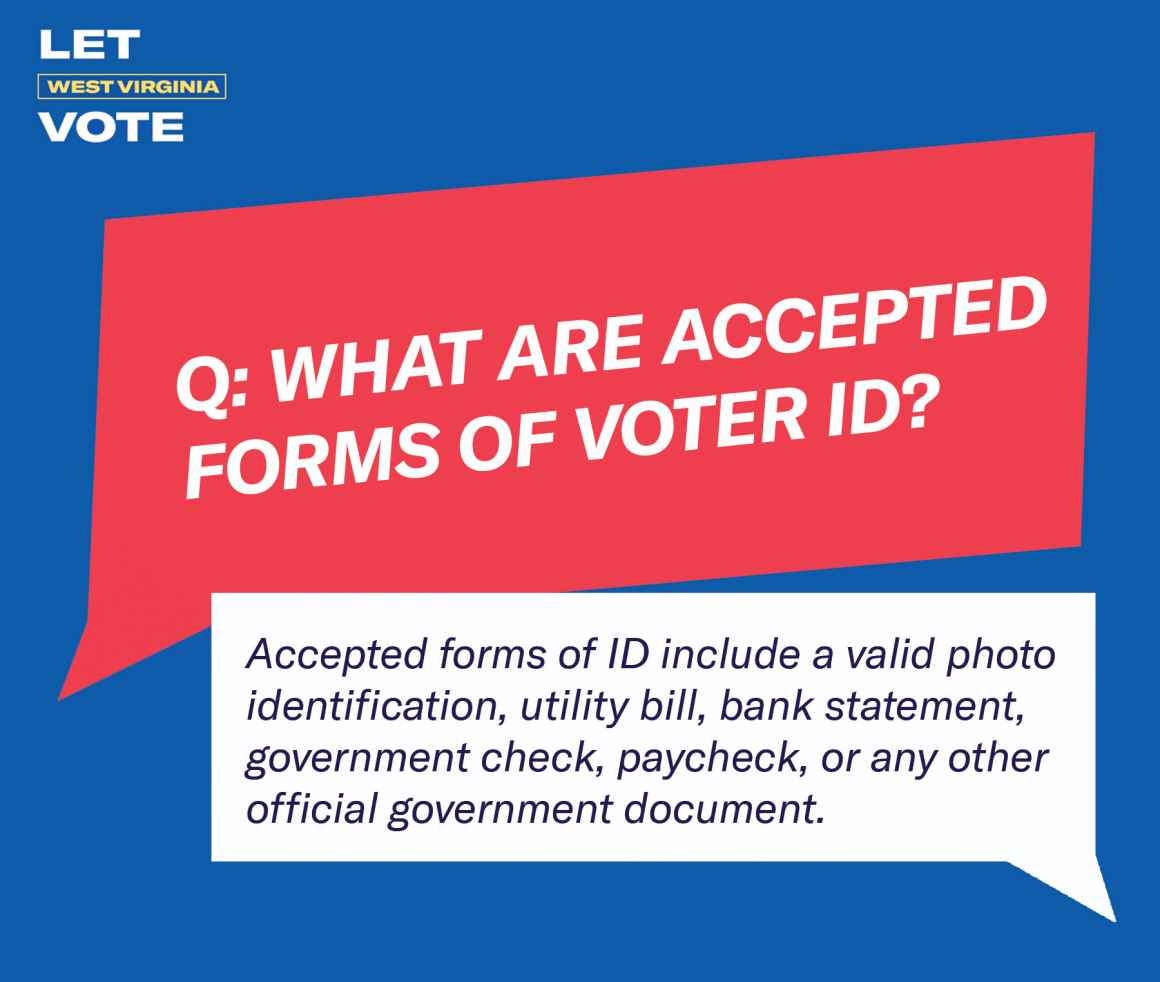
What if I don’t have any ID?
• A poll worker who knows you can allow you to vote. Alternatively, a person who can show their photo ID and has known you for at least 6 months can sign a sworn statement saying you are who you claim to be. You may be required to respond to a mailing confirming that you voted.
What is a provisional ballot?
• A provisional ballot is used to record your vote when there’s an unresolved question about your eligibility.
Will my provisional ballot be counted?
• Your provisional ballot will only be counted if election officials determine after the election that you were eligible to vote. Most provisional ballots aren’t counted, and you should use one only if there’s no way for you to vote on a regular ballot.

What if I’m not on the voter list?
• First, ask a poll worker to check the list again and to confirm that you’re at the right polling place.
• If you’re at the right polling place but your name isn’t on the voter list, ask for a provisional ballot. You have the right to cast a provisional ballot, even if your name is not on the voter list, as long as you’re willing to swear that you believe you are registered to vote.
What if I go to the wrong polling place?
• Go to the right polling place. You can ask a poll worker to help you find the polling place where you’re registered. You can also call your County Clerk’s office or look up your polling place online at https://services.sos.wv.gov/Elections/Voter/FindMyPollingPlace.
• If you can’t figure out where you’re registered, go to the polling place that you think is most likely to be the right one and ask for a provisional ballot. You have the right to cast a provisional ballot even if you’re not sure that you’re at the right polling place.
What if someone challenges my right to vote?
• Ask for a provisional ballot. Election officials will rule on the challenge before the election results become final.
What if someone tries to intimidate or harass me?
• Tell a poll worker right away. If the poll worker is the problem, tell a poll watcher, call your County Clerk’s office, or call one of the election hotline numbers listed at the end of this brochure.
What if I make a mistake on my ballot or the voting machine malfunctions?
• Tell a poll worker before you cast your vote. If you make a mistake on a paper ballot, you have the right to a replacement ballot as long as you catch your mistake before you cast your ballot. If your voting machine malfunctions tell a poll worker right away.
How do I make a complaint?
• First, ask for an election supervisor at your polling place. He or she can handle most routine complaints that arise on Election Day. Candidate, political parties, and nonprofit groups may also have poll watchers at your polling place who might be able to assist you. If any of those people ask you who you voted for, or if they can’t resolve your complaint, call your County Clerk’s office or the Secretary of State
Secretary of State Voter Hotline:
(304) 558-6000
ACLU-WV Election Protection Hotline:
(304) 355-5012
(304) 345-9246
ACLU National Election Protection:
866-OUR-VOTE (687-8683)
US Department of Justice:
(800) 253-3931

Reproductive Rights – Reproductive rights is a group of rights related to reproductive health and choice. Reproductive rights include the right to use contraception and to choose the type of contraception that is best for you. It includes ensuring people have access to products that promote reproductive health, including menstrual products. It includes the right to choose whether and when to become a parent and a choice of fertility healthcare. It also includes the right to abortion if a person does not want to be pregnant. Many people are aware of ongoing attempts to restrict access to abortion directly or through policies that make it harder for abortion providers to operate. However, other restrictions include limiting the availability of contraception, menstrual products, and fertility treatments. Your vote can help assure these rights are protected.
Criminal Justice – Our criminal legal system is expensive, inefficient, unfair and racist. Police practices lead to certain communities and people being over-policed. Too often it also means police violence. In our courts, the rights of people who are charged with crimes are constantly being chipped away. Jails and prisons are overcrowded and dangerous. Even when someone has paid their debt to society, they face massive barriers to being able to rejoin society.
Juvenile Justice – Our juvenile justice system is set up to punish kids when they act out, rather than help them before they get in trouble. The result is that we pull kids out of their homes and lock them in jails and hospitals that may be hours away from their families – sometimes even in other states. We need to rethink our juvenile justice system to help kids who are at risk before they get into serious trouble. And we need to make sure we have resources in our communities so that there are age-appropriate consequences that won’t further harm the child and their families.
Immigrants’ Rights – Many people come to America to escape poverty and violence or to find new opportunities. Unfortunately, immigrants have been targeted with policies that make it very difficult to enter and stay. They have been targeted with family separation, expedited deportations, often with little chance to explain their case. Immigrants have been targeted based on where they come from the religion they practice, and the color of their skin. Federal elections can help to change these policies, but local elections matter too. Local representatives can help put pressure on the federal government to do the right thing. State and local politicians can also create laws that either build a welcoming environment, or that create more stigma and difficulties for newcomers.
Voting Rights – Everyone should have the right to vote. Unfortunately, there are a variety of ways that voting can be made more difficult. Voter ID laws are a common way to restrict the vote. Certain people, like the elderly, people experiencing homelessness, college students, and formerly-incarcerated people may be less likely to have acceptable IDs. Other states have limited where people can vote, making people travel further and lines longer. Other states have aggressively purged voter registrations. All of these attacks on our right to vote justified by raising false fears about illegal voting. Multiple studies have shown that voter fraud is extremely rare. Elected officials should make it easer to vote. They should ensure enough polling places and proper training for poll workers. They can expand the registration period. They can allow voters to use absentee ballots. These are steps to ensure everyone gets a say in how our country is run.
Privacy and Technology – New technologies have changed how we live, work, shop, and socialize. But new technologies also mean companies can gather more information about us than ever before. In addition to companies, the government has new tools that it can use to watch us. The people we elect have the power to set rules for private companies and for the government on what information can be collected, how it can be collected, and how it can be used.
LGBTQ Equality – The Supreme Court has affirmed that gay and lesbian couples can get married. More recently, it ruled that people cannot be discriminated against in the workplace based on their sexual orientation or gender identity. Despite these advances, people still face discrimination in housing, healthcare, access to credit and by some businesses. LGTBQ students still face harassment in schools and may even be denied access to things as simple as the right bathroom. Waiting on the courts to fix each of these issues means many more people will suffer. Instead we need to elect people who will ensure that who you love, or how you identify is not a reason to deny people basic dignities.
